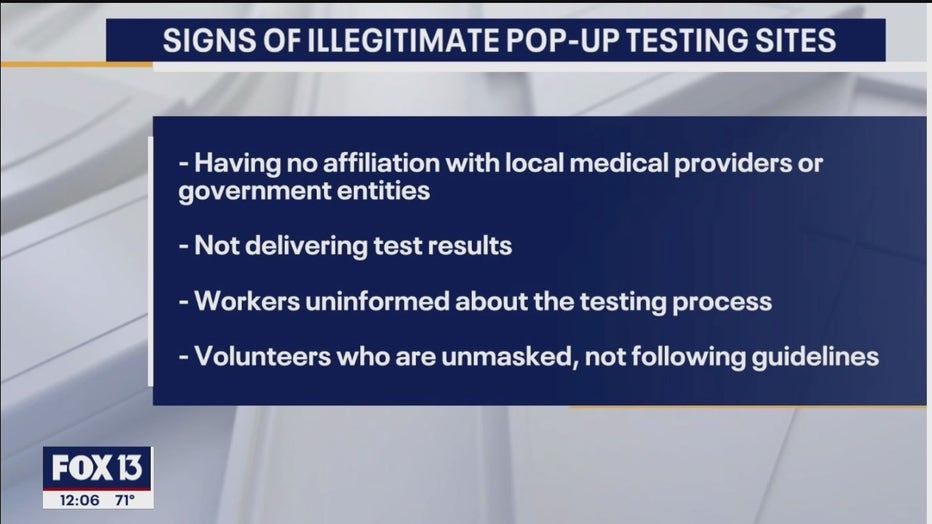Florida attorney general: Be alert about COVID-19 testing scams
TALLAHASSEE, Fla. - Florida's attorney general is out with a consumer alert warning Floridians about new and reemerging COVID-19 test scams as omicron variant cases increase nationwide.
"With more and more people seeking tests, scammers may be exploiting this demand to steal personal, financial or medical information," Attorney General Ashley Moody's office said in a January 6 announcement. "There are recent reports in Florida and nationwide of potential fake COVID-19 testing sites, imposter health care workers at legitimate sites, and at-home testing scams."
Long lines at in-person testing sites have caused thousands of Floridians to seek the convenience of at-home COVID-19 tests and testing services. Before purchasing one of these tests or providing personal information to companies offering at-home testing services, particularly online, the AG's office urges test-seekers to follow these steps to verify the legitimacy of the product:
- Only purchase products from a well-established, legitimate store or website.
- Search online for the brand name of the test and any complaints.
- Beware of private companies that offer free or reduced-cost at-home testing services, particularly if those companies require private information to make an appointment
- Watch out for private companies that require personal information to sign up for an at-home testing service but will not guarantee an appointment time.
"As we have seen throughout the pandemic, scammers change tactics as news and situations change," according to Moody’s statement. "With the recent rise in the number of people seeking COVID-19 tests comes an increased risk that scammers will try to take advantage of the demand. Please take precautions to protect your personal information when seeking a test—whether at a legitimate site or when purchasing an at-home test."

In addition to at-home test scams, there have been recent reports of suspicious COVID-19 testing sites popping up in Illinois. The sites appear legitimate but are designed to steal personal information from unsuspecting test seekers. Signs of illegitimate, pop-up testing sites include:
- Having no affiliation with local medical providers or government entities.
- Not delivering test results.
- Workers seeming uninformed about the testing process.
- Volunteers that are unmasked or not following current Center for Disease Control and Prevention point-of-care guidelines and the Occupational Safety and Health Administration’s standards during interactions with patients.
MORE: Federal government extends expiration date for 1 million Florida COVID-19 test kits
Law enforcement in Sarasota received reports in late December of suspicious people impersonating health care workers at a legitimate testing site asking test seekers to provide personal, financial, and medical information.
Moody's office urged test-seekers to ask the following questions to help spot a testing-site imposter:
- Are they dressed the same as the other health care workers on-site?
- Are they interacting with test seekers within the established test-site area?
- Can they accurately and correctly answer questions without seeming nervous or confused?
- Do they pressure test seekers for personal or financial information?
- Are health care guidelines and standards being followed?
RELATED: Is 4 better than 3? Health experts consider need for another COVID booster
The U.S. Food and Drug Administration reviews and authorizes the use of products to prevent or treat COVID-19, including vaccines, tests, drugs and non-vaccine biological products, medical products, devices and more. To view the list, click here.
"Unfortunately, bad actors may sell unproven or illegal products to profit off the pandemic," Moody's office said. "Not only are these products ineffective, but they could endanger consumers. FDA’s website provides an updated list of fraudulent products and warning letters of firms who have been reported for selling these fake products."
Anyone who suspects a COVID-19 test-related scam should report it to local law enforcement, or to the Florida Attorney General’s Office by calling 1(866) 9NO-SCAM or visiting MyFloridaLegal.com.


